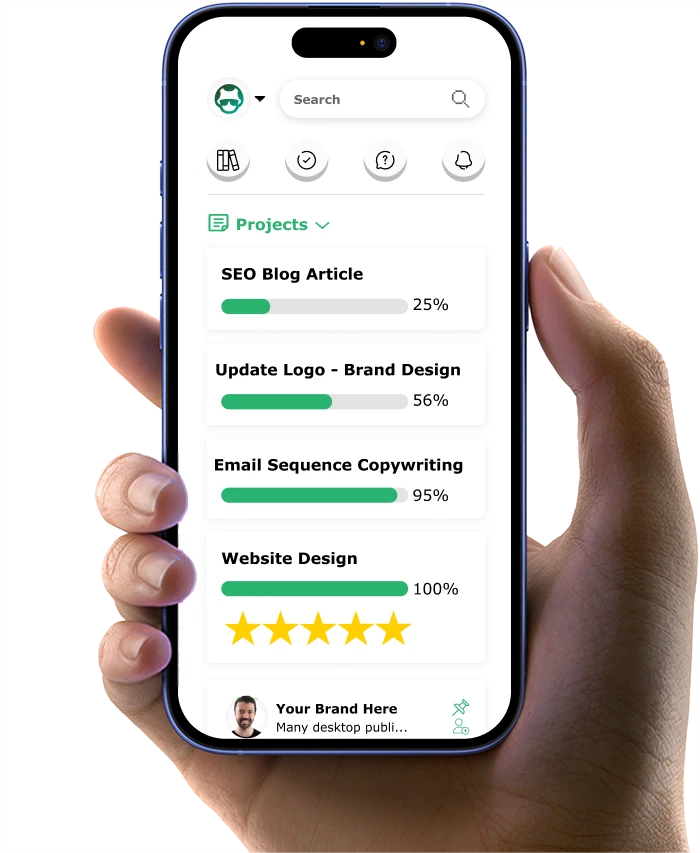13 Insights from Our Journey to $1.2 Million ARR in 2021

In 2020, Growbo’s sales were *tanking*, but it was (sort of) expected…
We had stopped selling one service and launched a brand new productized service (same offer we sell today). The two offerings were completely different, and so, with the pandemic also raging, sales dropped off a cliff in Q1 and Q2...
I had personal conviction (See Lesson #1 below) that our new offering would be successful, but that transition period felt like being in a dark room looking for the light switch.
At the time of writing this article, it's 2023—so, some time has passed since breaking the 7-figure milestone in 2021. This has given time to reflect on Growbo’s journey and how I might package what I learned for your benefit, oh dear reader.
7-figures seemed like the top of the mountain to me at one time, and I know it might also feel the same for many marketers and entrepreneurs in our audience (you?), but now that we’ve exceeded it, the intent with this article is to help you either (a) climb up here faster and/or (b) inspire you to keep climbing.
In today's article (and video) I’ve done my best to be real with you, no hype or BS.
The journey is never over, you never actually “arrive” at success or perfection. At best, perfection is a path we must walk daily, the work never ends so it's important to always learn how to do better while optimizing for enjoyment.
Here’s the “pics or it didn’t happen” snapshot of Growbo’s revenue for 2021 on Stripe—the rest came from Paypal:

So with that said, here’s some of what we’re covering coming up (and don’t forget about the lessons in between those listed below). Also Alex, my co-writer on this article did a great job interviewing me, so consider checking out the video as well …
- Growth Lesson #1: You’re Only a Few, Even One Great Decision Away from Success
- Growth Lesson #4: Double Down on What Gets Results
- Growth Lesson #7: Know Your Founder Superpower
- Growth Lesson #9: Master Your Time or Face Burnout and Chaos
- Growth Lesson #10: Focus—Do Less, Do It Better, and Ignore Needless Distractions
- Growth Lesson #11: Know Your Margins and Stick to Them Like a Nun to Jesus
- Growth Lesson #13: Discomfort as an Opportunity for Growth
Ready? Let’s jump right into it …
Get your own copy of this article to read it anytime, anywhere: Download “13 Insights from Our Journey to $1.2 Million ARR in 2021” so you won’t forget to take action on it later. Click here to download it now.

Growth Lesson #1: You’re Only a Few, Maybe One Great Decision Away from Success
In the face of the pandemic, we made a calculated but risky decision. Our sales were doing well actually with a different service we were providing.
But I knew that productized service would not scale as well for us or our clients. It also felt counter to our mission and core values as a company long term. So we made a shift and quickly launched a new productized service:
Done-for-you digital marketing team in a box–i.e. have marketing work to delegate but don’t want to deal with the headaches of hiring? Growbo is the solution.
Here’s how (UGLY) our sales looked during the chaotic transition period when we were gutting our funnel and relaunching new pages and campaigns every day:
Despite the sales data looking bleak at first, we were determined to solve this problem we saw rampant across all industries—the need for a complete, on-demand, quality-minded marketing team.
So we moved forward, with conviction in that one decision to shift.
We also created a unique “vehicle” to deliver the service, our custom-built app, which allows clients to delegate marketing tasks effortlessly.
Here’s a quick visual look at how our solution works if you’re not familiar:
So even though this transition was chaotic, boasting hints of uncertainty at times—with our sales initially going down—we were committed to our decision.
We stuck with our new business model, enhancing and optimizing it along the way to provide more value for our clients. And eventually, in the latter half of 2020, we began to see a steady increase in sales.
Our one great decision to move forward in a new, more valuable direction paid off for our company.
Growth Lesson #2: Lack of Diligence or Imagination May Hold Your Business Back
Innovation can be the lifeblood of a growing business. And often, the only thing capping your growth is your own or your team's lack of diligence or imagination.
In fact, according to Business DIT, 84% of consumers say innovation is important in a company’s ability to sell them a product or service.
However, there's another aspect to consider. You may also hit a ceiling due to your company's capacity to meet growing demand.
For instance, in 2021, Growbo faced challenges in handling excess demand. This required a strategic approach to ensuring client retention, while also exceeding their expectations.
In turn, we hired more talented professionals and streamlined our workflows in accordance with our new business model.
And speaking of talented professionals, your growth could also be blocked by the quality of your team. The proficiency level of your team directly influences your company's development.
It's vital to evaluate both your and your team's abilities, identify areas for improvement, and relentlessly strive to be better.
Never stop questioning or pushing for further progress.
Growth Lesson #3: The Importance of Focusing on the Problem/Pain Point
When building your service or product, never lose sight of the problem you're solving. Every decision should circle back to this fundamental pain point.
If you consistently attune your solution to healing or fixing people’s pain points, your perceived value and customer satisfaction will go through the roof.
In Growbo’s case, we're launching custom-built, white-label partnership features to help our clients scale faster. The core problem is, businesses often need a comprehensive marketing team for a variety of reasons, and not having a competent team on board restricts their growth.
By focusing on this issue, we can refine our offerings, optimize workflows, and improve relationships with clients, ensuring that each one gets the solution they need—a marketing team on demand.
Growth Lesson #4: Double Down on What Gets Results
One key to consistent growth is sticking to (though always enhancing) what works. There's no secret trick or shiny hack that will offer you a magic shortcut to success.
Remember, marketing is really about people—the ability to empathize with your audience and clients and adapt accordingly.
A prime example is our content creation. When we got extremely busy in 2021, we took a small break from producing more content for our own website, which, in hindsight, affected our SEO traffic.
Our prior content creation effort was a major factor that led us to grow rapidly and become profitable. In the end, halting it was not the best move.
So, in the words of Noah Kagan, "Scale the peaks, baby!" When you see a strategy yielding results, keep using it until it stops working. Don't always let the allure of a shiny distraction steal your attention from what's working right now.
Consistently providing value and building goodwill with your audience are, without a doubt, ways that keep your business growing and scaling.
Start doubling down on your marketing and content creation, whether for an eCommerce store, coaching business, or SaaS. Growbo.com is the place to start. Delegate your marketing projects without the typical headaches of hiring. Start Your $7-for-7-Day Trial Now.
Growth Lesson #5: Adjusting the Offer Until It Works
If an offer resonates with your audience, but the numbers don't match up, keep making incremental adjustments until it works.
Ideally, achieving profitability requires providing plenty of value relative to the price.
Growbo is a great example. We started as an agency but wanted to build something more scalable to have a greater impact. So we transitioned to a subscription-based business model where unlimited requests could be made.
This model had high perceived value among our clients. We continued to innovate, adjust, add additional skill sets, and stack the value—a process that we continue to this day.
It's sometimes difficult to identify the right improvements, but continuous, minor, meaningful adjustments have consistently improved client satisfaction and retention for us.
Growth Lesson #6: Without a Solid Team, Your Company’s Growth Potential is Capped
The growth potential of your company is inherently limited without a team. According to International Data Corporation, companies with strong teams will garner:
- A 30% lower employee turnover rate
- A 30% boost in productivity
- A 30% increase in revenue per employee over the competition
Solo entrepreneurs may make substantial amounts. Yet, building a company that can exist and operates outside of your own capabilities requires a solid team.
Some entrepreneurs underestimate this need. Instead, they focus on lifestyle businesses or operations they can handle individually. But in reality, you need to build a marketing team with diverse skills that complement yours and share in your vision.
The "right people on the bus in the right seats" principle from Jim Collins' book "Good to Great" perfectly captures this concept.
He emphasizes prioritizing people before strategy, which involves attracting the right people, removing the wrong ones, and assigning the right roles before focusing on business tactics.
A great team increases the probability of your business scaling to higher levels because it expands your skill set and capacity.
Conversely, working alone or having the wrong person on your team can negatively impact your potential growth.
Growth Lesson #7: Know Your Founder Superpower
Every person has unique latent abilities that can be leveraged to their advantage. For founders and CEOs, identifying these 'superpowers' can be critical to the success of their companies.
Some of these abilities might have roots in your childhood or personal experiences. The process involves introspection, where you identify experiences and characteristics that shape your unique abilities.
These skills or traits set you apart from others. They can contribute to your problem-solving ability and conviction to succeed.
For me, a high physical and mental pain tolerance is my superpower. This quality, in my opinion, is particularly beneficial for entrepreneurs who must confront and solve new problems—often without any straightforward solutions.
The 'pain' of these challenges can be hard to handle, but with this kind of tolerance, entrepreneurs can push forward and find solutions, rather than giving up or avoiding the issue.
Recognizing your superpower can help guide how you apply your energy and efforts. It increases your self-esteem while strengthening your ability to overcome whatever stands in the way.
Growth Lesson #8: Prioritizing the Reduction of Technical and Operational Debt
In running a business, especially those involving technical aspects, you will likely encounter what is called 'technical debt.'
This term differs from financial debt. Instead, it describes situations where you have ongoing technical issues or improvements that must be addressed over time.
For example, you may have plans for significant website upgrades but limited resources to implement these changes simultaneously.
Likewise, 'operational debt' refers to the inefficiencies in your workflow, or operations that need improvement. Operational debt can be easier to handle, as it involves adjusting workflows and responsibilities, rather than dealing with things like coding or design issues.
The key strategy to managing both technical and operational debt is to prioritize. Identify what improvements are most critical and focus on those first.
This prioritization is an exercise in realistic assessment, determining what needs to be done now and what can wait.
Growth Lesson #9: Master Your Time or Face Burnout and Chaos
Mastering time is a crucial skill in the world of entrepreneurship. If you don't, you might find yourself in a state of chaos and burnout.
Personally, I use my DDOME Task System to combat this issue and streamline my workday.
Here's what 'DDOME' stands for:
- Done: I deduce when the task should be completed.
- Due: I plan out my tasks for the day or week.
- Order: I determine the sequence in which I'll tackle these tasks.
- Minutes: I estimate the time it will take to complete each task.
- Energy: I gauge whether a task will boost my energy, drain it, or have no effect.
After outlining these elements, I make sure to write a detailed description for each task.
This system is more than just a tool to organize my time—it makes my day enjoyable and significantly improves my productivity. With a clear plan and progress tracking, I get a sense of accomplishment as I complete each task.
I've also found it necessary to incorporate personal well-being into my schedule. So, I include tasks related to health and mindfulness, such as making sure to eat lunch, exercising, and meditating.
In essence, this DDOME System gamifies my workday, making it more engaging and satisfying. It's a tool I use daily, and I highly recommend these time management tips for entrepreneurs juggling various tasks and aiming for success.
Need to save time and get quality marketing work completed for your business or clients? Growbo.com gets it done-for-you fast by letting you delegate your marketing projects and tasks to a full team of professionals. Watch A Demo.
Growth Lesson #10: Focus—Do Less, Do It Better, and Ignore Needless Distractions
In entrepreneurship, focus is the key. Do less, but do it better. And remember, the only voices that matter are those of your team and customers.
The world is full of shiny objects that might distract you. Currently, it's AI. Not too long ago, it was cryptocurrency.
Some may choose to integrate them, but at Growbo, our primary focus remains the same: harnessing talent and orchestrating the marketing process with custom technology toward creative ends. That's our core competency.
For me, entrepreneurship isn't about being a serial entrepreneur. Some see that as a badge of honor, but I don't aspire to be that. My aim is to stay focused on one company and keep refining what we do—accelerating creativity and the entrepreneurial spirit.
As a business owner, marketer, or entrepreneur, it's easy to fall for 'shiny object syndrome' due to high energy levels.
Another entrepreneur, Alex Ramosi, called it the 'Woman in the Red Dress'—a reference to a scene from The Matrix where a beautiful distraction turns out to be a deadly threat.
The more successful you become, the more tempting these shiny objects or 'Women in Red Dresses' will be.
It requires discipline to say no to nearly everything except what truly matters—listening to your team and customers and focusing on solving their pain points.
Steve Jobs once said, “People think focus means saying yes to the thing you've got to focus on. But that's not what it means at all. It means saying no to the hundred other good ideas that there are.”
This principle is applicable not only to entrepreneurs and business owners but also to anyone on a journey of success. Say 'no' a lot. Stay focused. Ignore the noise.
Growth Lesson #11: Know Your Margins and Stick to Them Like a Nun to Jesus
If there's one thing that entrepreneurs, especially those in their early stages, tend to overlook, it's understanding their margins.
But here's the simple truth: if you don't maintain profitability as a business, you won't have a business for very long.
This is why I say, know your margins and stick to them like a nun to Jesus. A good profit margin is a key to endurance and long-lasting success.
The most straightforward way to grasp your margins is to conduct a simple COGS, or cost of goods sold, analysis.
Essentially, a COGS analysis involves figuring out all the costs associated with selling a product or service to one customer. Then, compare these costs to your revenue. Naturally, your revenue should always exceed your costs.
There are two types of margins to consider: gross margin and net margin (which can also be seen as net profit margin or net cash flow positive for the period in question). Each has its own relevance.
Gross margin gives you insight into the unit economics, whereas net margin provides a wider view of the profitability of your whole business over a specific period.
For Growbo, our main focus is on net margin. This is because, at the end of the day, it's the net remainder that we can save and reinvest to grow the business further.
However, every business is unique, and you might have to choose between focusing on gross margin or net margin based on your particular circumstances.
Both offer valuable insights, but from different perspectives. The moral of the story: understanding and sticking to your margins is absolutely crucial.
Growth Lesson #12: The Power of Balanced Motivation
David Goggins talks about keeping a "cookie jar" filled with the negative things people have said or done to you throughout your life. You can dip into this jar whenever you need some fuel to work harder.
I've used this method extensively.
During my first years in business, I wrote down quotes from people who had been critical of me, especially from family members. I posted these on the wall in front of me to keep them in my sight at all times.
I had comments like "You seem lazy and unambitious" on there, which I used as fuel to drive me. Having this "cookie jar" in front of me all day motivated me, and we hit six figures in our first year while remaining profitable.
But relying on this kind of negative motivation can wear you down over time. I've been working to adjust my mindset a little—to not just be driven by anger and negativity, but also to be pulled forward by positivity.
At a certain point, anger ceases to be an effective driver on its own.
It's better to balance negative motivations with positive ones, keeping a bit of both on hand to fuel you when you need it. Both forms of motivation have their uses, and finding the right balance is key.
Growth Lesson #13: Discomfort as an Opportunity for Growth
When you're comfortable, it often signifies that you're not growing as much as you could.
We naturally gravitate towards comfort, making us feel like we've "arrived" after achieving certain milestones, like making a sale, launching a new feature, or hitting a specific revenue goal.
But really, you should always be a little uncomfortable because comfort often means stagnation.
Think about it in terms of going to the gym. It's the discomfort of pushing yourself physically that leads to muscle growth and increased stamina. The same is true in business. The mental discomfort of solving complex or challenging problems helps to build mental resilience.
It could be said that friction feeds the fire of growth.
Steve Jobs once compared building a team or company to a rock tumbler. Regular, jagged rocks go in, there's lots of friction as they grind against each other, and eventually, beautiful polished gems come out.
This process of pushing against the comfort zone allows people to grow, improving both the team and the company as a whole.
Always remember that discomfort can be a doorway to opportunity, so never shy away from being uncomfortable.
Conclusion
Ready to apply the lessons of this article to your entrepreneurial journey? At Growbo.com, we're here to help you along the way — all you have to do is delegate. Start Your $7-for-7-Day Trial Now.
Ultimately, these 13 lessons are about learning from the entrepreneurial journey, overcoming obstacles, and persevering toward success.
Let's quickly recap some of the key points from this article:
- We discussed the importance of clear communication and setting the right expectations for yourself and your team.
- We emphasized the significance of a team and why it's essential to invest time in hiring the right people.
- We underlined the power of focus, to do less, but do it better, while ignoring shiny distractions.
- We delved into the necessity of knowing your margins and sticking to them.
- We explored the idea of using anger as a motivational force while balancing it with hope for a better future.
- Finally, we stressed that discomfort equals growth, advising entrepreneurs to use discomfort in order to improve and level up.
If you need help implementing these lessons into your business, reach out to Growbo—your go-to marketing support system. We'll help you take care of everything from web design and sales funnel creation to copywriting and video production.
And one more thing: I’d love to know which of these lessons resonates with you the most.
Have you already implemented some of them into your entrepreneurial journey? Do you have any personal lessons you'd like to share?
Let me know in the comments below.
Keep Growin', stay focused.














